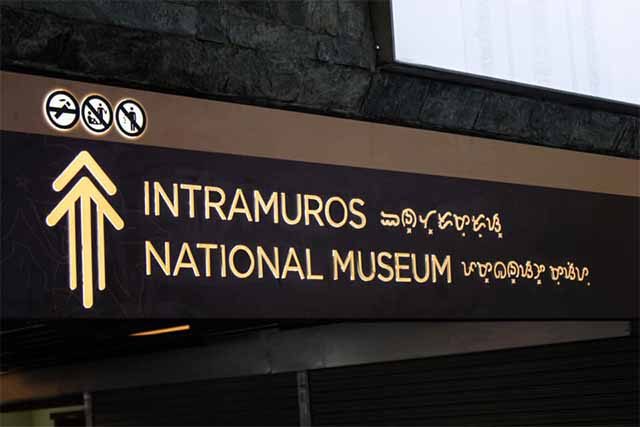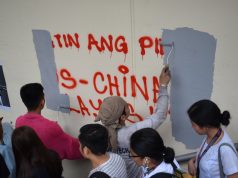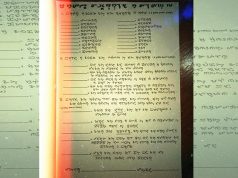The reveal of the new look of the recently rehabilitated Lagusnilad Underpass in Manila on Monday was met criticisms after some online users noticed that the signages were also written in Baybayin.
Baybayin is a pre-Spanish script used in Luzon and other parts of the Philippines before it was replaced by the Latin or Roman alphabet.
RELATED: Lagusnilad underpass gets new look, sees return of ‘Books from Underground’
While some were amused by the modernized look of the famed tunnel or the Manila City Hall Underpass, the directional signages bearing Baybayin characters sparked debate online.
‘What’s the use of the Baybayin translation?’
Majority of the critics questioned the need for the Baybayin, citing that not all can understand the script.
“Who even uses Baybayin for day-to-day activities?” MillennialOfMNL asked.
The critics stressed the need for directional signs’ functionality.
“While having Baybayin there is cool, but let’s not forget that signages are functional. There is a science behind it, ensuring maximum visibility, readability and viewer’s safety. With these considerations, I’d rather not put a ‘cool’ translation that no one can actually read,” a Twitter user said.
the level of performative wokeness has me screaming. you know what would have made sense?
ICONS for the illiterate
TRANSLATIONS for tagalog readers
NOT BAYBAYIN as basically no one is proficient🚉 istasyon ng tren – LRT 1 sentral
🏛 bulwagang panlungsod ng maynila
🏢 sm manila https://t.co/dp3v9gnGiC— jari bot (@gudejari) August 24, 2020
nothing's wrong in advocating for baybayin, but remember that baybayin is not the only system of writing we have in the country. baybayin cannot encapsulate the culture of a whole nation when you exclude the other systems of writing.
— ani #StopTheKillings 🏳️🌈 (@xannetteflixacc) August 24, 2020
‘There are other writing systems’
Some online users criticized the use of Baybayin for not encapsulating “nationalism,” citing that there are other systems of writing.
“Clarify ko lang that there may be more than 16 pre-colonial writing systems in the country. Regardless, each of these should be equally valued and preserved properly. Focusing on just one has a lot of implications eh like essentializing what our culture is as a people,” another user said.
“Nothing’s wrong in advocating for Baybayin, but remember that Baybayin is not the only system of writing we have in the country. Baybayin cannot encapsulate the culture of a whole nation when you exclude the other systems of writing,” a fellow Twitter user echoed.
These writing systems include Pampanga’s Kulitan, Ilocandia’s Kurdita, Mindoro’s Haninu’o and Buhid, Northern Plaawan’s Tagbanwa, Bicolandia’s Basahan, Visayan’s Badlit, Tausug’s Jawi, Maguindanaon’s Kirim, among others.
FUN FACT:
The Philippines has multiple native scripts besides Babayin & they’re all so beautiful 💕💕💕 pic.twitter.com/DiDJzd9sQM
— cheska 💌 (@not_cheska) August 24, 2020
the national government's hard push for Baybayin is a performative bit of essentialist "nationalism" that prioritizes aesthetics over any actual meaningful attempts at building awareness of our history or dialoguing with our identity https://t.co/skS4zMiV4O
— Æ GENERAL COMMUNITY PERPETUAL RECLUSION MICROBLOG (@ajejelicano) August 24, 2020
yall really be using baybayin for aesthetic purposes & not for functional use ano? napaka performative & impractical. who tf even converses in baybayin? 💀💀💀
nationalism =/= putting a syllabic writing system when majority of the citizens are not knowledgeable about it. https://t.co/wYGSmwSSEs
— sherie louise (@sherieloo) August 24, 2020
Incorrect usage?
Others argued that the use of the Baybayin in the signage was incorrect.
“Writing baybayin should be syllabic, kung papaano binigkas ganon na ganon ang pagsulat so L should be written as “EL” then R should be “AR” T should be “TI” same goes sa SM S-> “ES” and M-> “EM”. For Ch it should be written as “TSA” write T then add pamudpod or cross then SA,” a user pointed out.
A Twitter user said putting a Tagalog or Filipino sign would have been better, citing that using Baybayin for the Tagalog is already problematic as she questioned how the script was used in English.
Why was Baybayin translation approved?
Baybain advocate group Baybayin Buhayin Inc. on Wednesday defended the inclusion of the script and said that its group only seeks to raise awareness on the usage of Baybayin.
The group composed of teachers, writers, artists, musicians and other professionals formed in 2010, said they are pushing to make Baybayin as the national script of the Philippines
“Ang samahan ay naitatag noong 2010 at patuloy na gumigising sa kamalayang Pilipino patungkol sa pagmamahal at pagtataguyod ng Baybayin gayundin ang iba pang katutubong wika sa kapuluan na may paraang pasulat tungo sa pambansang kaunlaran at pagkakaisa,” it said in a statement.
“Kaya naman di nag-atubiling tumulong ang Baybayin Buhayin upang magkaroon ng mga baybayin sa mga signages sa Maynila,” the group added.
The group explained that the font used in Lagusnilad Underpass were also from them and was created by its co-founder John NL Leyson who is currently based in London, United Kingdom.
Baybayin Buhayin’s tech team member Edrian Garcia also closely coordinated with the team behind the rehabilitation.
How Baybayin should be used
Meanwhile, to address the issues on correct usage of the script, the Baybayin Buhayin Inc. founder Jaime “Jay” Enage shared some guidelines
“Sa Pagdadaglat ay maaari po tayong makaharap ng tatlong senaryo lalo sa mga bago pa lamang nagbabaybayin,” Enage said.
Enage enumerated and elaborated the following rules on baybayin including the difference on ancient approach, abbreviation as well as pronunciation
“Una ay ang Katutubong Pamamaraan (ancient approach). Ito po ung hindi gumagamit ng birama o pamatay patinig at tinatanggal din ang mga patinig sa mga dulo ng bawat salita. Kamangha-mangha ang sistemang ito pero kayang kayang basahin ito ng ating mga ninuno nung unang panahon. Kinikilala natin ang katutubong pamamaraan na ito at dapat ring ituro ito upang malaman natin ang ating kasaysayan at kultura mula sa ating mga ninuno.”
“Ikalawa ay ang Dinaglat (abbreviate) ito po ang masasabing katanggap-tanggap sa kasalukuyang panahon na paraan ng pagdadaglat upang maiwasan ang kalituhan. Sa sistemang ito ginagamitan ng pamatay patinig ang mga katinig upang ipakitang dinadaglat nga ang salita ating binabasa.”
“Ikatlo ay ang Ayon sa Pagbigkas (as pronounce) sa paggamit ng Sistema na ito kailangan ng permiso sa nagmamay-ari kung ito ang gagamitin. Tutungo ito sa “branding” kaya dapat na unawain itong maigi.”
Baybayin Buhayin reminded Filipinos that usage of the Baybayin always depends on context.
“Hindi sa lahat ng pagkakataon panuntunan na ‘kung anong Bigkas ay siyang baybay’ ay ating gagamitin,” the group said.
“Pero ang mga teknikalidad na ito ay hindi ang punto kung bakit kami tuloy-tuloy na nagsusulong ng baybayin sa loob ng sampung taon. Ang nais po ng aming grupo ay magkaroon ng isang batas hinggil sa ating wikang panulat at ito ay maging ating pambansang wikang panulat,” it added.
Enage’s explanation was also echoed by the group in a separate tweet.
Narito ang aming unang pahayag tungkol sa daglat ng SM at LRT sa Lagusnilad underpass kung saan kami ang nag apruba at gumawa nito#Baybayin#BaybayinBuhayin#Lagusnilad2020 pic.twitter.com/rIhKdFPZpk
— Baybayin Buhayin Inc. (@BaybayinBInc) August 24, 2020
Pending Baybayin bills
Several bills have been filed in both the House and Senate to push for the institution of the use of Baybayin in logos, government agencies, as well as to make it the Philippines’ national writing system.
In 2019, Agence France-Presse reported that “regional cultural advocates say such efforts threaten all of the nation’s indigenous scripts.”
“Their anger is rooted in a 1937 proclamation that Tagalog be the basis of the national spoken language now called Filipino, and they see the revival of the Baybayin text as another blow for the nation’s linguistic diversity,” the report read.
Expert on Kapampángan language and culture Mike Pangilinan in 2018 said that they are not in favor of making Baybayin the mandatory national writing system, citing that they have their “own writing which are accurately represents our own language” which is the Kulitan.
Bayabyin Buhayin, on the other hand, is calling on the public to support the bills pending before the House of Representatives and the Senate.
“Hinihikayat naming ang lahat na ito ay suportahan. At nawa’y maging dahilan ito upang pagkaisahin ang mga Pilipino at magbigay halaga sa ating Sining at Kulturang Pilipino,” it said.










